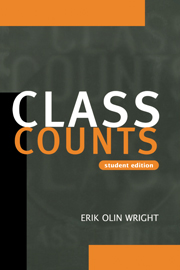Book contents
- Frontmatter
- Contents
- Preface to student edition
- Preface to original edition
- Acknowledgments
- 1 Class analysis
- Part I Structural analyses of classes
- Part II Class and gender
- 6 Conceptualizing the interaction of class and gender
- 7 Individuals, families and class analysis
- 8 The noneffects of class on the gendered division of labor in the home
- 9 The gender gap in workplace authority
- Part III Class structure and class consciousness
- Part IV Conclusion
- References
- Index
- Index of subjects
6 - Conceptualizing the interaction of class and gender
Published online by Cambridge University Press: 22 September 2009
- Frontmatter
- Contents
- Preface to student edition
- Preface to original edition
- Acknowledgments
- 1 Class analysis
- Part I Structural analyses of classes
- Part II Class and gender
- 6 Conceptualizing the interaction of class and gender
- 7 Individuals, families and class analysis
- 8 The noneffects of class on the gendered division of labor in the home
- 9 The gender gap in workplace authority
- Part III Class structure and class consciousness
- Part IV Conclusion
- References
- Index
- Index of subjects
Summary
6.1 The debate over class primacy
In many ways, the most sustained challenge to class analysis as a central axis of critical social theory in recent years has come from feminists. Class analysts, especially in the Marxist tradition, have often implied that class was a “more important” or “more fundamental” dimension of social structure than gender. While such claims to explanatory primacy have rarely been explicitly defended, the relative inattention to gender in the Marxist tradition is taken by many commentators as a de facto denigration of gender as a significant explanatory factor.
To some extent this suggestion that class is “more important” than gender is simply a by-product of a specific set of theoretical preoccupations. To focus on class as a causal mechanism in social explanations implies bracketing other concerns. Class analysis is an “independent variable” specialty, and of necessity this means focusing on class and its ramifications and giving relatively less attention to other causal factors. This does not absolve class analysts from the criticism of sometimes overstating the explanatory power of class for certain problems, but it does imply that the sheer fact of focusing on class and its effects is not a legitimate basis for indicting class analysis.
There are times, however, when the claim that class (or closely associated concepts like “mode of production” or “economic structure”) is “more important” than other factors is a substantive thesis, not a heuristic device. Classical historical materialism is the most elaborated instance of such an argument.
- Type
- Chapter
- Information
- Class Counts , pp. 115 - 124Publisher: Cambridge University PressPrint publication year: 2000

